Der Kongress tanzt/The Congress dances (Erik Charell, 1931) was an immensely popular German film operetta. It was the best film of the 'Dream Team' of the European Cinema of the 1930s, Lilian Harvey and Willy Fritsch.

Lilian Harvey in Der Kongress tanzt/The Congress dances (Erik Charell, 1931). German postcard by Ross Verlag, no. 600. Photo: Ufa.
The cast of Der Kongress tanzt/The Congress dances (Erik Charell, 1931) included many of the great stars of the Weimar Cinema: Willy Fritsch as Tsar Alexander I of Russia and his doppelgänger, Uralsky, Otto Wallburg as Bibikoff, his Adjutant, Conrad Veidt as Prince Metternich, Carl-Heinz Schroth as his Secretary, Pepi, Lil Dagover as the Countess and Alfred Abel as the King of Saxony.
The female lead of Christel Weinzinger, the lovely glove seller, was played by British born, German actress and singer Lilian Harvey, Ufa's biggest star of the 1930s.
Der Kongress tanzt takes place during the 1814 Congress in Vienna, when the crowned heads of Europe gathered together to devise a strategy for dealing with Napoleon and decide the shape (and fate) of the continent. It would hold - with some serious cracks - for exactly 100 years.
The Russian Tsar Alexander I is traveling incognito among the people in the tradition of his ancestor Peter the Great, coming across a witty and charming Viennese glove seller, Christel Weinzinger. She announces her business by throwing flowers with a visiting card into each carriage that drives past. As the story unfolds, Christel is accused of an assassination attempt and finally condemned. The punishment is however waived and Christel is again free.
The Tsar, having fallen in love with Christel, uses the visiting card, in order to visit her in her business. A romance develops, with Austrian prince chancellor Metternich and his army of spies intending to use the situation to further his own agenda. This however clashes with Pepi, his secretary, who is also in love with Christel. Christel tells her friends about the romance, which is naturally not believed. Only as the Tsar arrives with a splendid carriage to fetch her, does astonishment set in.
The romance is terminated when Napoléon Bonaparte escapes from the island of Elba and marches upon Paris. The Tsar, as all other rulers, has to leave. Christel stays behind, miserable, but finds solace with Pepi.
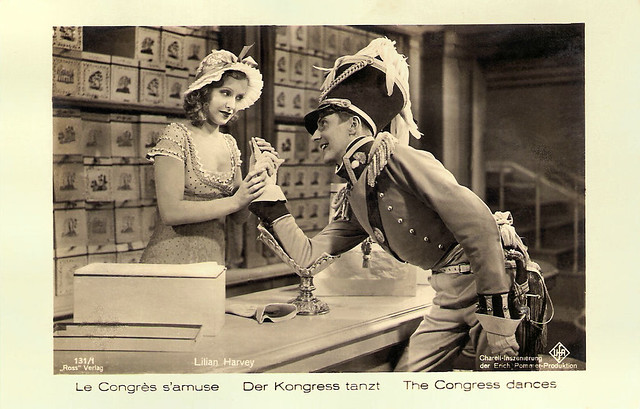
German postcard by Ross Verlag, no. 131/1. Lilian Harvey and Carl-Heinz Schroth in Der Kongress tanzt/The Congress dances (Erik Charell, 1931).
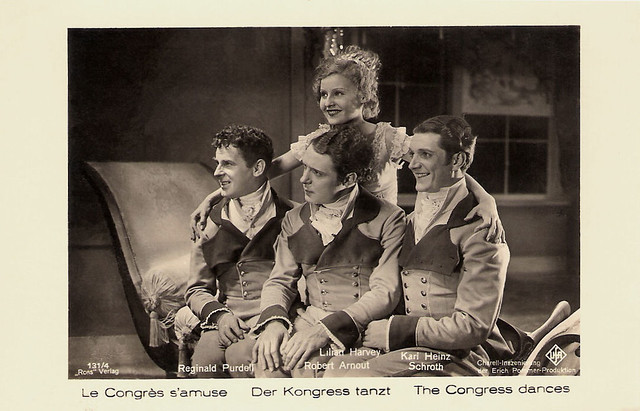
German postcard by Ross Verlag, no. 131/4. Photo: Ufa. Still with Lilian Harvey, Reginald Purdell, Robert Arnout and Carl-Heinz Schroth in Der Kongress tanzt/The Congress dances (Erik Charell, 1931).

German postcard by Ross Verlag, no. 131/6. Photo: Ufa. Still with Lilian Harvey and Willy Fritsch in Der Kongress tanzt/The Congress dances (Erik Charell, 1931).
Lilian Harvey and Willy Fritsch had played together for the first time in the silent films Die keusche Susanne/The Innocent Susanne (Richard Eichberg, 1926) and Ihr dunkler Punkt/Her Skeleton in the Closet (Johannes Guter, 1928) with Harry Halm.
The two actors teamed up again for the seminal film operetta Liebeswalzer/The Love Waltz (Wilhelm Thiele, 1929), which established them as the immensely popular ‘Dream Couple of the German Cinema’.
They followed Liebeswalzer with a string of box office hits: Die Drei von der Tankstelle/The Three of the Gas Station (Wilhelm Thiele, 1930), Der Kongress tanzt/The Congress dances (Erik Charell, 1931) and Ein blonder Traum/A Blonde's Dream (Paul Martin, 1932), also with Willi Forst.
Each of these films featured several Harvey/Fritsch songs, which became popular hits and were also released on records, and thereby further added to the popularity of the two stars.
After an intermezzo of Harvey in Hollywood, Willy Fritsch joined her in the propagandistic drama Schwarze Rosen/Black Roses (Paul Martin, 1935), as well as in the screwball comedy Glückskinder/Lucky Kids (Paul Martin, 1936).
Frau am Steuer/Woman at the Wheel (Paul Martin, 1939) was to be the last collaboration between Fritsch and Harvey, who had made twelve films together.
While Lilian Harvey left Nazi Germany and emigrated via France to the USA, Willy Fritsch continued his career throughout the 1940s with new partners like Marika Rökk and Marte Harell.
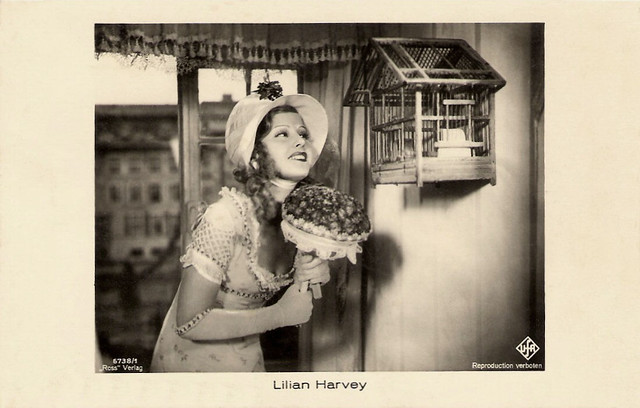
German postcard by Ross Verlag, no. 6738/1, 1931-1932. Photo: Ufa. Still with Lilian Harvey in Der Kongress tanzt/The Congress dances (Erik Charell, 1931).
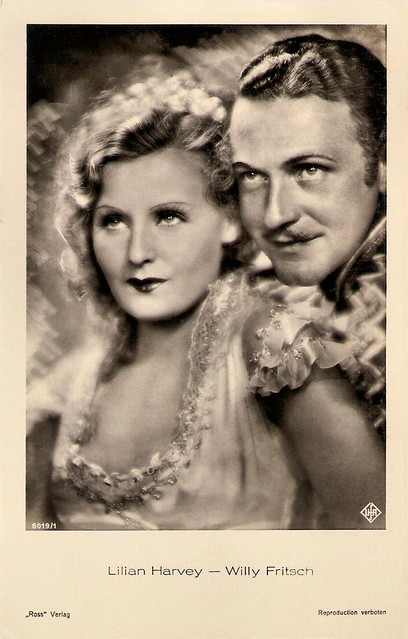
German postcard by Ross Verlag, no. 6059/1, 1931-1932. Photo: Ufa. Still with Lilian Harvey and Willy Fritsch in Der Kongress tanzt/The Congress dances (Erik Charell, 1931).
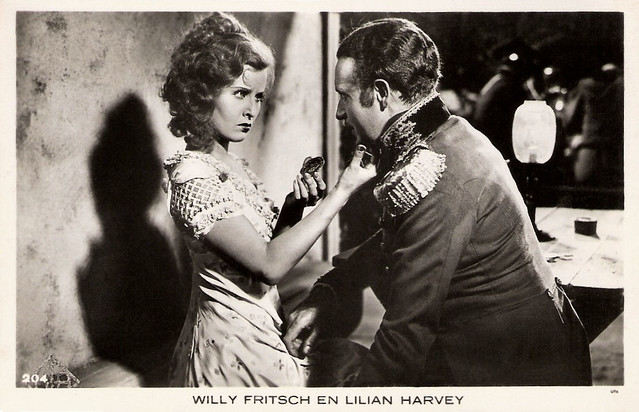
Dutch postcard, no. 204. Photo: Ufa. Still with Lilian Harvey and Willy Fritsch in Der Kongress tanzt/The Congress dances (Erik Charell, 1931).
Der Kongress tanzt/The Congress dances (Erik Charell, 1931) was produced by Erich Pommer for the Ufa as one of the studio's first sound films.
Der Kongress tanzt is a particularly well achieved move in Ufa's attempt to challenge US supremacy in the European film arena, taking advantage of the introduction of sound.
As such, the studio released the film in three different language versions: in German, in French as Le congrès s'amuse, and English as The Congress dances. Lilian Harvey played in all three versions, as she spoke all languages with no accent; Henri Garat replaced Willy Fritsch for the French and English versions.
Ufa spared no efforts: the sets were lavish and top talent made up the entire technical cast.
Bruce Eder at AllMovie: "Der Kongress tanzt was one of the most ambitious and successful historical romances of its era, and marked one of the most serious attempts by Germany's Ufa Studios to compete with Hollywood on its own terms -- that it didn't make a lasting impact had more to do with political and cultural events in Germany than any shortcoming in this particular movie. "
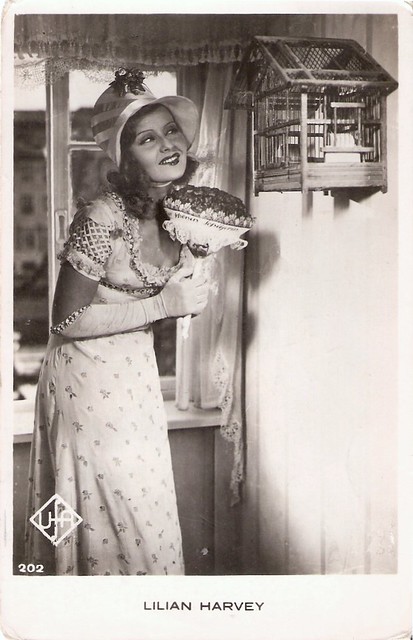
Dutch postcard, no. 202, 1931-1932. Photo: Ufa. Still with Lilian Harvey in Der Kongress tanzt/The Congress dances (Erik Charell, 1931).
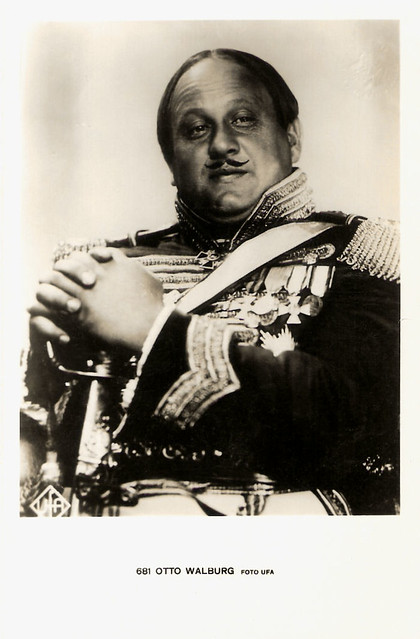
Dutch postcard, no. 681. Photo: Ufa. Still from Der Kongress Tanzt/The Congress dances (Erik Charell, 1931) with Otto Wallburg.
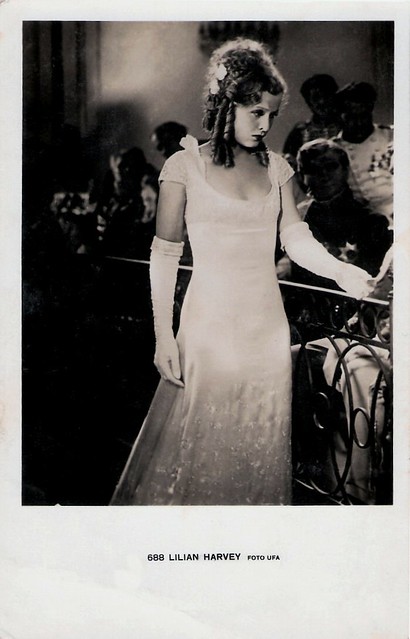
Dutch postcard, nr. 688. Photo: Ufa. Still from Der Kongress Tanzt/The Congress dances (Erik Charell, 1931) with Lilian Harvey.
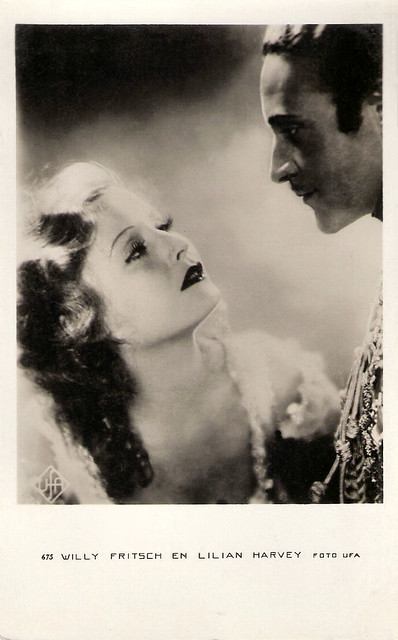
Dutch postcard, no. 675. Photo: Ufa. Still with Lilian Harvey and Willy Fritsch in Der Kongress tanzt/The Congress dances (Erik Charell, 1931).
Der Kongress Tanzt/The Congress Dances (Erik Charell, 1931) was the first - and only - German film of director Erik Charell.
The film operetta is not only a classic of the early German sound cinema, showing all the capabilities of the Ufa, but also a promising start of a film career that was not to be realized. Charell had to leave Nazi-Germany and was unable to continue his career as a film director abroad.
It is curious that the film was banned by Reich Minister of Propaganda Joseph Goebbels only but in October 1937.
Jan Onderwater at IMDb: "Der Kongress Tanzt may not be perfect technically, but this is a sensual, made with great fun, original, capricious and extravagant operetta. It has elegance, a great cast, brilliant music and songs, wit, great sets; some scenes are even a bit bizarre and fetishist. This is not a filmed operetta, but a real film-operetta. More than just direct, Erik Charell choreographed the film.
Although the film stands on its own feet, the influence of Ernst Lubitsch is evident. Many operetta films have been made, but none so innovative, brilliant as this one."
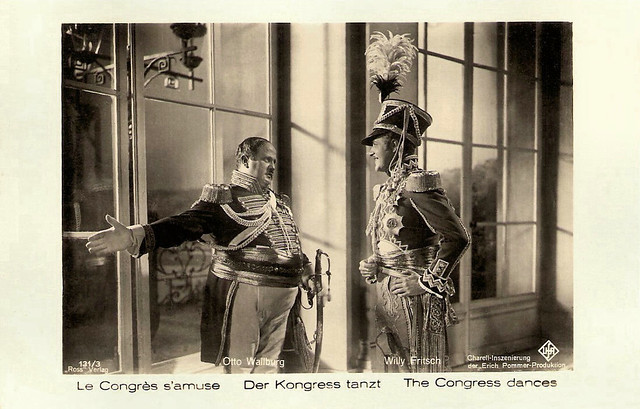
German postcard by Ross Verlag, no. 131/3. Photo: Ufa. Still from Der Kongress Tanzt/The Congress dances (Erik Charell, 1931) with Otto Wallburg and Willy Fritsch.
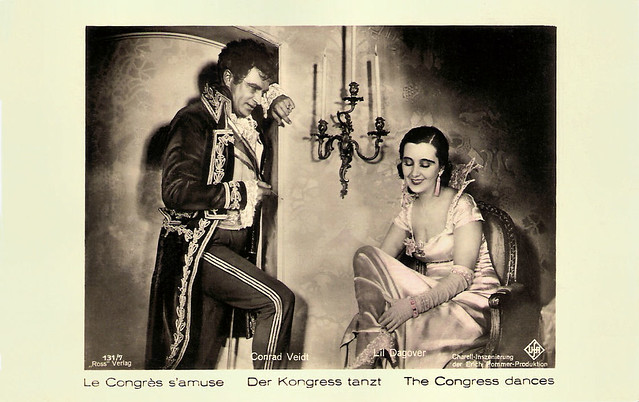
German postcard by Ross Verlag, no. 131/7. Photo: Ufa. Still with Conrad Veidt and Lil Dagover in Der Kongress tanzt/The Congress dances (Erik Charell, 1931).
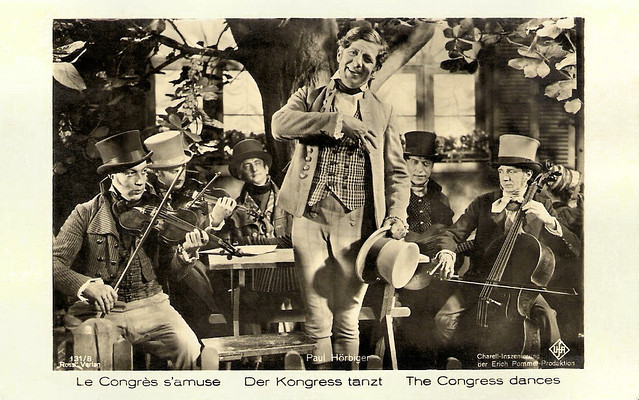
German postcard by Ross Verlag, no. 131/8. Photo: Ufa. Still from Der Kongress Tanzt/The Congress dances (Erik Charell, 1931) with Paul Hörbiger.
Sources: Jan Onderwater (IMDb), Bruce Eder (AllMovie), Wikipedia and IMDb.

Lilian Harvey in Der Kongress tanzt/The Congress dances (Erik Charell, 1931). German postcard by Ross Verlag, no. 600. Photo: Ufa.
Lilian Harvey
The cast of Der Kongress tanzt/The Congress dances (Erik Charell, 1931) included many of the great stars of the Weimar Cinema: Willy Fritsch as Tsar Alexander I of Russia and his doppelgänger, Uralsky, Otto Wallburg as Bibikoff, his Adjutant, Conrad Veidt as Prince Metternich, Carl-Heinz Schroth as his Secretary, Pepi, Lil Dagover as the Countess and Alfred Abel as the King of Saxony.
The female lead of Christel Weinzinger, the lovely glove seller, was played by British born, German actress and singer Lilian Harvey, Ufa's biggest star of the 1930s.
Der Kongress tanzt takes place during the 1814 Congress in Vienna, when the crowned heads of Europe gathered together to devise a strategy for dealing with Napoleon and decide the shape (and fate) of the continent. It would hold - with some serious cracks - for exactly 100 years.
The Russian Tsar Alexander I is traveling incognito among the people in the tradition of his ancestor Peter the Great, coming across a witty and charming Viennese glove seller, Christel Weinzinger. She announces her business by throwing flowers with a visiting card into each carriage that drives past. As the story unfolds, Christel is accused of an assassination attempt and finally condemned. The punishment is however waived and Christel is again free.
The Tsar, having fallen in love with Christel, uses the visiting card, in order to visit her in her business. A romance develops, with Austrian prince chancellor Metternich and his army of spies intending to use the situation to further his own agenda. This however clashes with Pepi, his secretary, who is also in love with Christel. Christel tells her friends about the romance, which is naturally not believed. Only as the Tsar arrives with a splendid carriage to fetch her, does astonishment set in.
The romance is terminated when Napoléon Bonaparte escapes from the island of Elba and marches upon Paris. The Tsar, as all other rulers, has to leave. Christel stays behind, miserable, but finds solace with Pepi.

German postcard by Ross Verlag, no. 131/1. Lilian Harvey and Carl-Heinz Schroth in Der Kongress tanzt/The Congress dances (Erik Charell, 1931).

German postcard by Ross Verlag, no. 131/4. Photo: Ufa. Still with Lilian Harvey, Reginald Purdell, Robert Arnout and Carl-Heinz Schroth in Der Kongress tanzt/The Congress dances (Erik Charell, 1931).

German postcard by Ross Verlag, no. 131/6. Photo: Ufa. Still with Lilian Harvey and Willy Fritsch in Der Kongress tanzt/The Congress dances (Erik Charell, 1931).
Willy Fritsch
Lilian Harvey and Willy Fritsch had played together for the first time in the silent films Die keusche Susanne/The Innocent Susanne (Richard Eichberg, 1926) and Ihr dunkler Punkt/Her Skeleton in the Closet (Johannes Guter, 1928) with Harry Halm.
The two actors teamed up again for the seminal film operetta Liebeswalzer/The Love Waltz (Wilhelm Thiele, 1929), which established them as the immensely popular ‘Dream Couple of the German Cinema’.
They followed Liebeswalzer with a string of box office hits: Die Drei von der Tankstelle/The Three of the Gas Station (Wilhelm Thiele, 1930), Der Kongress tanzt/The Congress dances (Erik Charell, 1931) and Ein blonder Traum/A Blonde's Dream (Paul Martin, 1932), also with Willi Forst.
Each of these films featured several Harvey/Fritsch songs, which became popular hits and were also released on records, and thereby further added to the popularity of the two stars.
After an intermezzo of Harvey in Hollywood, Willy Fritsch joined her in the propagandistic drama Schwarze Rosen/Black Roses (Paul Martin, 1935), as well as in the screwball comedy Glückskinder/Lucky Kids (Paul Martin, 1936).
Frau am Steuer/Woman at the Wheel (Paul Martin, 1939) was to be the last collaboration between Fritsch and Harvey, who had made twelve films together.
While Lilian Harvey left Nazi Germany and emigrated via France to the USA, Willy Fritsch continued his career throughout the 1940s with new partners like Marika Rökk and Marte Harell.

German postcard by Ross Verlag, no. 6738/1, 1931-1932. Photo: Ufa. Still with Lilian Harvey in Der Kongress tanzt/The Congress dances (Erik Charell, 1931).

German postcard by Ross Verlag, no. 6059/1, 1931-1932. Photo: Ufa. Still with Lilian Harvey and Willy Fritsch in Der Kongress tanzt/The Congress dances (Erik Charell, 1931).

Dutch postcard, no. 204. Photo: Ufa. Still with Lilian Harvey and Willy Fritsch in Der Kongress tanzt/The Congress dances (Erik Charell, 1931).
Erich Pommer
Der Kongress tanzt/The Congress dances (Erik Charell, 1931) was produced by Erich Pommer for the Ufa as one of the studio's first sound films.
Der Kongress tanzt is a particularly well achieved move in Ufa's attempt to challenge US supremacy in the European film arena, taking advantage of the introduction of sound.
As such, the studio released the film in three different language versions: in German, in French as Le congrès s'amuse, and English as The Congress dances. Lilian Harvey played in all three versions, as she spoke all languages with no accent; Henri Garat replaced Willy Fritsch for the French and English versions.
Ufa spared no efforts: the sets were lavish and top talent made up the entire technical cast.
Bruce Eder at AllMovie: "Der Kongress tanzt was one of the most ambitious and successful historical romances of its era, and marked one of the most serious attempts by Germany's Ufa Studios to compete with Hollywood on its own terms -- that it didn't make a lasting impact had more to do with political and cultural events in Germany than any shortcoming in this particular movie. "

Dutch postcard, no. 202, 1931-1932. Photo: Ufa. Still with Lilian Harvey in Der Kongress tanzt/The Congress dances (Erik Charell, 1931).

Dutch postcard, no. 681. Photo: Ufa. Still from Der Kongress Tanzt/The Congress dances (Erik Charell, 1931) with Otto Wallburg.

Dutch postcard, nr. 688. Photo: Ufa. Still from Der Kongress Tanzt/The Congress dances (Erik Charell, 1931) with Lilian Harvey.

Dutch postcard, no. 675. Photo: Ufa. Still with Lilian Harvey and Willy Fritsch in Der Kongress tanzt/The Congress dances (Erik Charell, 1931).
Erik Charell
Der Kongress Tanzt/The Congress Dances (Erik Charell, 1931) was the first - and only - German film of director Erik Charell.
The film operetta is not only a classic of the early German sound cinema, showing all the capabilities of the Ufa, but also a promising start of a film career that was not to be realized. Charell had to leave Nazi-Germany and was unable to continue his career as a film director abroad.
It is curious that the film was banned by Reich Minister of Propaganda Joseph Goebbels only but in October 1937.
Jan Onderwater at IMDb: "Der Kongress Tanzt may not be perfect technically, but this is a sensual, made with great fun, original, capricious and extravagant operetta. It has elegance, a great cast, brilliant music and songs, wit, great sets; some scenes are even a bit bizarre and fetishist. This is not a filmed operetta, but a real film-operetta. More than just direct, Erik Charell choreographed the film.
Although the film stands on its own feet, the influence of Ernst Lubitsch is evident. Many operetta films have been made, but none so innovative, brilliant as this one."

German postcard by Ross Verlag, no. 131/3. Photo: Ufa. Still from Der Kongress Tanzt/The Congress dances (Erik Charell, 1931) with Otto Wallburg and Willy Fritsch.

German postcard by Ross Verlag, no. 131/7. Photo: Ufa. Still with Conrad Veidt and Lil Dagover in Der Kongress tanzt/The Congress dances (Erik Charell, 1931).

German postcard by Ross Verlag, no. 131/8. Photo: Ufa. Still from Der Kongress Tanzt/The Congress dances (Erik Charell, 1931) with Paul Hörbiger.
Sources: Jan Onderwater (IMDb), Bruce Eder (AllMovie), Wikipedia and IMDb.
No comments:
Post a Comment